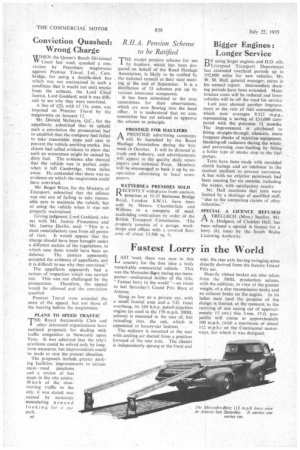Conviction Quashed: Wrong Charge
Page 40

If you've noticed an error in this article please click here to report it so we can fix it.
WHEN the Queen's Bench Divisional VI' Court last week quashed a conviction by Petersham magistrates against Premier Travel, Ltd., Cambridge: for using a double-deck bus which was not maintained in such a condition that it would not emit smoke from the exhaust, the Lord Chief Justice, Lord Goddard, said it was difficult to see why they were convicted.
A fine of £20, with £5 15s. costs. was imposed on Premier Travel by the magistrates on January 12.
• Mr. Donald McIntyre, Q.C., for the appellants, submitted that to uphold such a conviction the prosecution had to establish that the company had failed to take • reasonable steps and care to prevent the vehicle emitting smoke. His clients had called evidence to show that such an occurrence might be caused by dirty fuel. The evidence also showed that the vehicle was in perfect order when it left Cambridge. three miles away. Ile contended that there was no evidence on which the magistrates could have convicted.
Mr. Roger Winn, for the Ministry of Transport, submitted that the offence was not one of failing to take reasonable care to maintain the vehicle, but of using the vehicle when it was not properly maintained.
Giving judgment. Lord Goddard. who sat with Mr. Justice Finnemore and Mr. Justice Devlin, said: "This is amost unsatisfactory case from all points of view. It would appear that the charge should have been brought under a different section of the regulations, in which case there would have been no defence. The justices apparently accepted the evidence of appellants, and it is difficult to see why they convicted."
The appellants apparently had a system of inspection which was carried out. This was not challenged by the prosecution. Therefore, the appeal would be allowed and the conviction quashed.
Premier Travel were awarded the costs of the appeal. but not those of the hearing before the magistrates.
PLANS TO SPEED TRAFFIC
THE Royal Automobile Club and other interested organizations have outlined proposals for dealing with traffic congestion in Newcastle upon Tyne. It was admitted that the city's problems could be solved only by longterm measUres, but improvements could be made to ease the present situation.
The proposals include greater parking facilities, improvements to certain main road junctions and a review of bus stops in the city centre. M itch of the slowmoving traffic in the city. it was stated, was caused by motorists meandering around looking for a car park.
a6




































































































